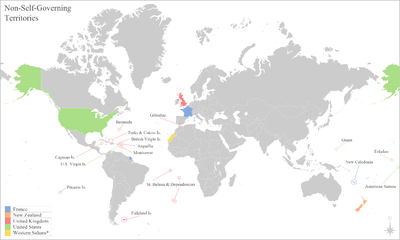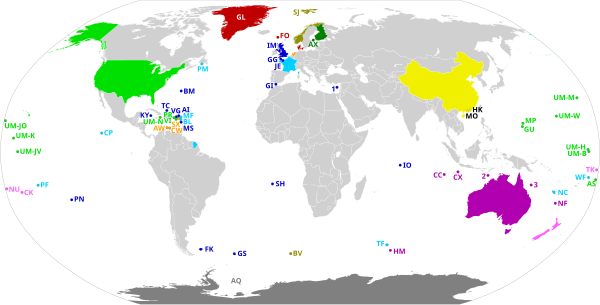| Part of the Politics series |
| Politics |
|---|
|
|

A colony is a territory subject to a form of foreign rule.[1][2] Though dominated by the foreign colonizers, the rule remains separate to the original country of the colonizers, the metropolitan state (or "mother country"), which together have often been organized as colonial empires, particularly with the development of modern imperialism and its colonialism. This coloniality and possibly colonial administrative separation, while often blurred,[2] makes colonies neither annexed or integrated territories nor client states. Colonies contemporarily are identified and organized as not sufficiently self-governed dependent territories. Other past colonies have become either sufficiently incorporated and self-governed, or independent, with some to a varying degree dominated by remaining colonial settler societies or neocolonialism.
The term colony originates from the ancient Roman colonia, a type of Roman settlement. Derived from colonus (farmer, cultivator, planter, or settler), it carries with it the sense of 'farm' and 'landed estate'.[3] Furthermore the term was used to refer to the older Greek apoikia (Ancient Greek: ἀποικία, lit. 'home away from home'), which were overseas settlements by ancient Greek city-states. The city that founded such a settlement became known as its metropolis ("mother-city"). Since early-modern times, historians, administrators, and political scientists have generally used the term "colony" to refer mainly to the many different overseas territories of particularly European states between the 15th and 20th centuries CE, with colonialism and decolonization as corresponding phenomena.
While colonies often developed from trading outposts or territorial claims, such areas do not need to be a product of colonization, nor become colonially organized territories. Territories furthermore do not need to have been militarily conquered and occupied to come under colonial rule and to be considered de-facto colonies, instead neocolonial exploitation of dependency or imperialist use of power to intervene to force policy, might make a territory be considered a colony, which broadens the concept, including indirect rule or puppet states (contrasted by more independent types of client states such as vassal states). Subsequently some historians have used the term informal colony to refer to a country under a de facto control of another state. Though the broadening of the concept is often contentious.
